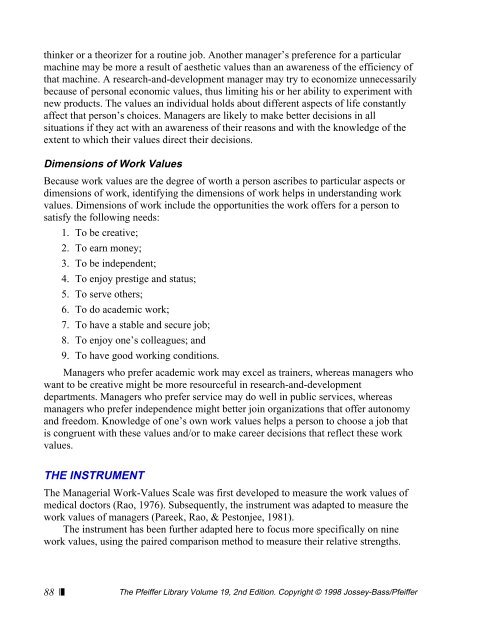motivational analysis of organizations
motivational analysis of organizations
motivational analysis of organizations
You also want an ePaper? Increase the reach of your titles
YUMPU automatically turns print PDFs into web optimized ePapers that Google loves.
thinker or a theorizer for a routine job. Another manager’s preference for a particular<br />
machine may be more a result <strong>of</strong> aesthetic values than an awareness <strong>of</strong> the efficiency <strong>of</strong><br />
that machine. A research-and-development manager may try to economize unnecessarily<br />
because <strong>of</strong> personal economic values, thus limiting his or her ability to experiment with<br />
new products. The values an individual holds about different aspects <strong>of</strong> life constantly<br />
affect that person’s choices. Managers are likely to make better decisions in all<br />
situations if they act with an awareness <strong>of</strong> their reasons and with the knowledge <strong>of</strong> the<br />
extent to which their values direct their decisions.<br />
Dimensions <strong>of</strong> Work Values<br />
Because work values are the degree <strong>of</strong> worth a person ascribes to particular aspects or<br />
dimensions <strong>of</strong> work, identifying the dimensions <strong>of</strong> work helps in understanding work<br />
values. Dimensions <strong>of</strong> work include the opportunities the work <strong>of</strong>fers for a person to<br />
satisfy the following needs:<br />
1. To be creative;<br />
2. To earn money;<br />
3. To be independent;<br />
4. To enjoy prestige and status;<br />
5. To serve others;<br />
6. To do academic work;<br />
7. To have a stable and secure job;<br />
8. To enjoy one’s colleagues; and<br />
9. To have good working conditions.<br />
Managers who prefer academic work may excel as trainers, whereas managers who<br />
want to be creative might be more resourceful in research-and-development<br />
departments. Managers who prefer service may do well in public services, whereas<br />
managers who prefer independence might better join <strong>organizations</strong> that <strong>of</strong>fer autonomy<br />
and freedom. Knowledge <strong>of</strong> one’s own work values helps a person to choose a job that<br />
is congruent with these values and/or to make career decisions that reflect these work<br />
values.<br />
THE INSTRUMENT<br />
The Managerial Work-Values Scale was first developed to measure the work values <strong>of</strong><br />
medical doctors (Rao, 1976). Subsequently, the instrument was adapted to measure the<br />
work values <strong>of</strong> managers (Pareek, Rao, & Pestonjee, 1981).<br />
The instrument has been further adapted here to focus more specifically on nine<br />
work values, using the paired comparison method to measure their relative strengths.<br />
88 ❘❚<br />
The Pfeiffer Library Volume 19, 2nd Edition. Copyright © 1998 Jossey-Bass/Pfeiffer

















